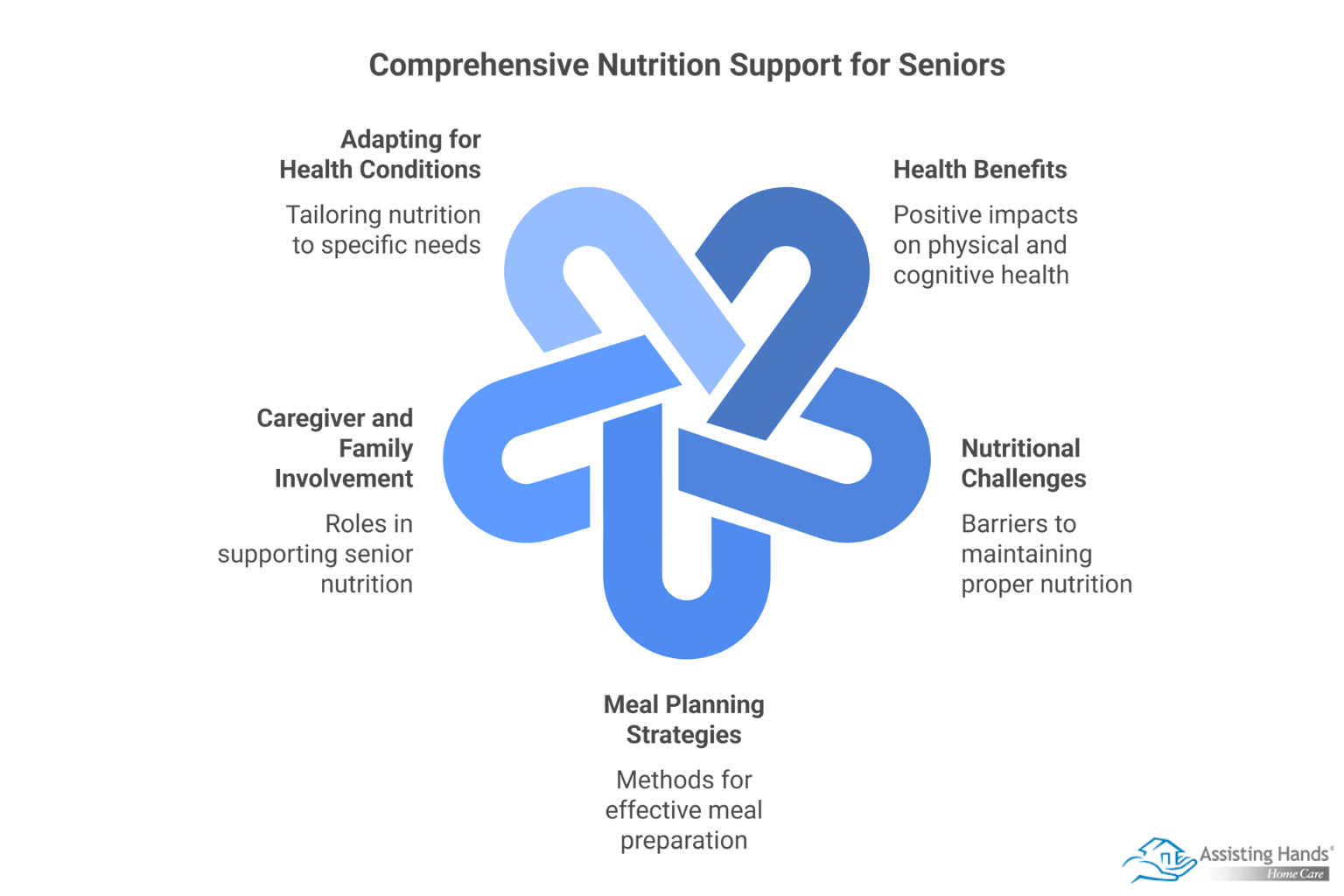
Table of Content
Proper nutrition becomes increasingly critical as we age, yet many seniors face unique challenges that make maintaining a healthy diet difficult. When seniors receive care at home, thoughtful meal planning and nutritional support can significantly impact their overall health, energy levels, and quality of life.
The Health Benefits of Proper Nutrition for Aging Adults
Good nutrition serves as the foundation for healthy aging, affecting everything from cognitive function to immune system strength. Seniors who maintain balanced diets experience better outcomes across multiple health indicators compared to those with poor nutritional habits.
Physical health advantages include stronger bones, better muscle mass retention, and increased cardiovascular health. Adequate protein intake can prevent sarcopenia, the age-related loss of muscle mass that contributes to falls and fractures. Essential vitamins and minerals support bone density, reducing osteoporosis risk.
Cognitive benefits emerge when seniors consume nutrient-rich foods regularly. Omega-3 fatty acids, antioxidants, and B vitamins support brain health and may boost cognitive health. Studies show that well-nourished seniors maintain better memory function and mental clarity compared to those with nutritional deficiencies.
Enhanced immune function results from consistent intake of vitamins C, D, and zinc along with other immune-supporting nutrients. This becomes particularly important for seniors, whose immune systems naturally weaken with age, making them more susceptible to infections and illnesses.
Some seniors need help preparing nutritious meals and healthy snacks. Not every senior has the same care needs, which means they don’t all need the same type of in-home care. You can rely on Assisting Hands Home Care to provide an individualized care plan to meet your elderly loved one’s unique care needs. Our caregivers help seniors focus on healthy lifestyle habits, such as eating nutritious foods, exercising regularly, and maintaining strong social ties, and we offer mentally stimulating activities that can boost cognitive health and delay the onset of dementia.

Common Nutritional Challenges Seniors Face
Many factors can interfere with a senior’s ability to maintain proper nutrition, creating barriers that require creative solutions and ongoing support from caregivers and family members.
Appetite changes frequently occur due to medications, reduced physical activity, or changes in taste and smell. Some seniors lose interest in food entirely, while others may crave only sweet or salty options that lack nutritional value.
Physical limitations can make shopping, cooking, and eating more difficult. Arthritis may prevent opening jars or cans, while vision problems make reading labels challenging. Dental issues or swallowing difficulties may limit food choices to soft textures that don’t provide complete nutrition.
Social and emotional factors also impact eating habits. Seniors who live alone may lose motivation to cook elaborate meals, while depression or grief can suppress appetite entirely. Fixed incomes may force choices between medications and nutritious foods, leading to compromised dietary quality.
Creating Effective Meal Plans for Home Care
Successful meal planning for seniors requires balancing nutritional needs with practical considerations like budget, preparation time, and individual preferences. A well-designed meal plan removes daily decision-making stress while ensuring consistent nutrition.
Weekly planning strategies help caregivers and families stay organized while reducing food waste. Create menus should incorporate:
- Protein sources at every meal (lean meats, fish, eggs, beans, dairy)
- Colorful fruits and vegetables for vitamins and fiber
- Whole grains for sustained energy and B vitamins
- Healthy fats from nuts, seeds, olive oil, and avocados
- Adequate hydration through water, herbal teas, soups, or broths
Batch-cooking methods save time and ensure consistent meal availability. Prepare large portions of soups, stews, and casseroles that can be portioned and frozen for later use. Pre-cut vegetables and fruits when energy levels are high, storing them for easy access during meal preparation.
Flexible options accommodate changing appetites and health conditions. Keep simple backup meals available for days when appetite is poor, such as smoothies with protein powder, easily digestible soups, or nutritious drinks.
Consider hiring a professional caregiver if you need someone to prepare nutritious meals for your loved one. In Reston, elderly home care providers can benefit aging adults in a variety of ways. From cooking nutritious meals to offering timely medication reminders, the dedicated caregivers at Assisting Hands Home Care are available to help your elderly loved one 24 hours a day, 7 days a week.
Involving Caregivers and Family in Nutrition Support
Successful nutrition management often requires a team approach, with family members, professional caregivers, and healthcare providers working together to support the senior’s dietary needs and preferences.
Professional caregiver training ensures consistent nutritional support when family members aren’t present. Caregivers should understand the senior’s dietary restrictions, medication interactions with food, and signs of nutritional problems. They can assist with meal preparation, encourage eating, and monitor food intake.
Family involvement remains crucial even when professional care is provided. Family members can:
- Shop for groceries and involve seniors in menu selection when possible
- Share favorite family recipes modified for current dietary needs
- Schedule regular mealtimes together, either in person or virtually
- Monitor weight changes and appetite patterns to discuss with healthcare providers
Communication systems help caregivers coordinate care among different people involved in the senior’s nutrition. Keep detailed notes about food preferences, successful meals, and any eating challenges. Regular check-ins with healthcare providers ensure nutritional strategies align with changing health conditions.
Adapting Nutrition Plans for Specific Health Conditions
Many seniors manage multiple health conditions that require dietary modifications, making personalized nutrition planning essential for optimal health outcomes and medication effectiveness.
Diabetes management requires careful carbohydrate monitoring and consistent meal timing. Focus on complex carbohydrates, lean proteins, and healthy fats while limiting simple sugars. Portion control becomes critical for maintaining stable blood glucose levels throughout the day.
Heart health considerations emphasize reducing sodium, saturated fats, and processed foods while increasing fiber-rich options. The DASH diet principles work well for many seniors, incorporating plenty of fruits, vegetables, whole grains, and lean proteins while limiting high-sodium processed foods.
Cognitive health support benefits from anti-inflammatory foods and brain-supporting nutrients. Mediterranean-style eating patterns, rich in olive oil, fish, nuts, and colorful produce, may support overall brain health.
Medication interactions require careful attention to timing and food combinations. Some medications work better with food, while others need to be taken on empty stomachs. Certain nutrients can interfere with medication absorption, making coordination with healthcare providers essential for safe and effective treatment.
Families who find it difficult to care for their aging loved ones without assistance can benefit greatly from professional respite care. Reston, VA, family caregivers who need a break from their caregiving duties can turn to Assisting Hands Home Care. Our caregivers can encourage your loved one to eat well, exercise regularly, get plenty of mental and social stimulation, and focus on other lifestyle factors that promote longevity. Reach out to us at Assisting Hands Home Care if you need compassionate professional care for your loved one. Call one of our dedicated Care Managers today to learn about the high quality of our in-home care services.








